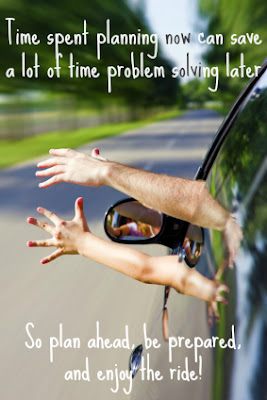School holidays are just around the corner, and if yours is one
of the lucky families planning a road trip, then these tips are just for you!
Whether you are just taking a quick day trip, or heading off for a couple of
weeks, better preparation and less stress will make for a much happier family
experience.
The key is not having a rigid schedule and
trying to ensure nothing can go wrong – rather it’s actually acknowledging that things
can and do go wrong at times, but you can be flexible and equipped to deal
with unexpected changes without the wheels falling off - figuratively speaking of course!
Plan Ahead:
- After you have plotted your route using your GPS / Google Maps / map book, check with your local road network authority, as close to your departure date as possible, for any road works or events which may cause road closures or delays along your route (eg. http://alerts.vicroads.vic.gov.au/)
- Plan frequent stops along the way at locations which provide the facilities you require – play equipment, baby change facilities, restaurant, petrol station, convenience store, ATM etc
- Check the weather forecast for the days you are travelling on, not just the days you will be at your destination, so that you can factor in longer travel time if it’s raining or snowing, or extra stops if it’s very hot
- Time your journey to avoid getting stuck in peak hour traffic when travelling through other main towns or cities
- Confirm your booking details and time restrictions which may apply for check-in and check-out, so that you can plan your arrival and departure times accordingly. You don’t want to arrive at your destination at 11am only to be told your room/campsite will only be available after 2pm!
Things to remember:
- Charge the batteries for the portable DVD player, iPad, camera, phone etc, and pack the chargers and car adapters in an easily accessible place
- Make sure your travel insurance is up-to-date and covers you for the location you are travelling to, and any activities you plan to do while you’re there
- Make sure your car insurance is up-to-date and covers you for the location you are travelling to, terrain you are travelling on, and any other drivers
- Make sure your RACV / NRMA (or other roadside assistance provider) membership is up-to-date
- Make sure you have working tools and jumper cables, and check your spare tyre
- Pack an ‘Emergency Kit’ in the car – First aid kit, water, toilet paper, tissues, wet wipes, non-perishable food, nappies if required, a towel, a change of clothing, and emergency contact details in case you lose your wallet or phone
Most importantly, remember...





No comments:
Post a Comment